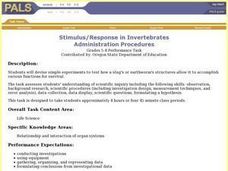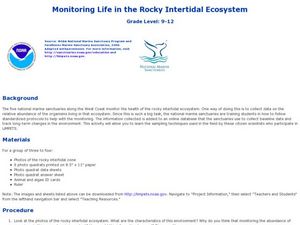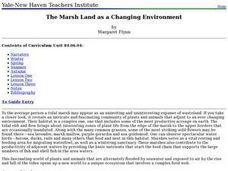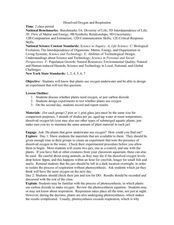NOAA
Watch the Screen!
Can a sponge cure cancer? Life science pupils visit the drugstore under the sea in the fifth activity of six. Working groups research the topic then get hands-on experience by testing the inhibiting effects of several plant extracts on...
NOAA
What Killed the Seeds?
Can a coral cure cancer? Take seventh and eighth grade science sleuths to the underwater drugstore for an investigation into emerging pharmaceutical research. The fifth installment in a series of six has classmates research the wealth of...
Curated OER
Invertebrate Study
Students study invertebrates, more specifically flatworms, in this technology-based lesson which features www.nettrekker.com and word processing skills. The lesson concludes with each student create an individual word file of information.
Curated OER
Stimulus/Response in Invertebrates
Students design and conduct and experiment to determine how invertebrates react to an outside stimulus such as light and other stimuli. Student must develop a clear plan of action, collect data in an organized manner and analyze their...
Curated OER
Vertebrate/Invertebrate Venn Diagram
Learners research the characteristics of Vertebrates and Invertebrates. They identify and explain those characteristics. Students create a Venn Diagram comparing/contrasting those characteristics.
Curated OER
Mighty Macroinvertebrates
Seventh graders identify the names and features of macroinvertebrates found in Turtle River. In this ecology instructional activity students use digital microscopes and take pictures of invertebrates.
American Museum of Natural History
The Tree of Life
Groups of species can have more in common than meets the eye. An interactive cladogram shows some of the connections between important groups of species. Learners click on sections of the diagram to learn more about the connections or on...
Curated OER
Monitoring Life In The Rocky Intertidal Ecosystem
Students investigate marine life by researching aquatic organisms on the Internet. In this oceanography lesson, students monitor algae and animals of the ocean by identifying their population and habitat on data sheet ID cards. Students...
Curated OER
What Is in the Water?
Students compare bottled water qualities to water found naturally in a pond habitat. They research their state's laws/regulations in regard to bottled water and study the advertising, cost, and quality of brands of bottled water. They...
Curated OER
Pond Ecology
A lab activity is a great way to incite thoughtful questioning and scientific processes. Pupils will collect organisms with a Petri dish, make observations, sketch the organism, ask questions, then attempt to identify the specimen...
Curated OER
Design a Reef!
Using a miniature coral reef aquarium kit, young ecologists model this unique ecosystem. They research various coral reef organisms and their niches, and they culminate the project by working together to write a report. Use this activity...
Curated OER
Comparative Embryological Study of
Students complete two labs. They observe the fertilization and development of sea urchin and zebrafish embryos. They examine the similarities and differences in the development of an invertebrate vs. a vertebrate animal.
Curated OER
Hide and Seek Science
Students examine macro-invertebrates in order to better understand their link to the food web. Working in groups, they record observations of several areas of a stream or river, collect samples from the river bottom, and identify the...
Curated OER
Pond Ecosystem Field Trip
Students investigate the environment by participating in a class trip. In this pond ecosystem lesson, students define a list of vocabulary terms associated with ponds such as invertebrate and metamorphosis. Students attend a field trip...
Curated OER
Food Webs in a Pond
Students explore food chains and food webs in a pond and identify common creatures found in ponds. They look for tadpoles, fish, mites and other creatures in a pond during a field trip for first hand research.
Curated OER
Making a Mini Worm Habitat
Third graders create an earthworm habitat. In this worms instructional activity, 3rd graders construct a KWL chart about earthworms and research their habitat. Students create a mini habitat for their earthworms by using gravel, sand,...
Curated OER
The Marsh Land as a Changing Environment
Sixth graders continue their examination of the state of Connecticut. After taking a field trip, they identify the types of birds, plants, invertebrates and vertebrates who make their home in the salt marshes. In groups, they identify...
Curated OER
The Benthic Drugstore
High schoolers examine active chemicals that are in marine invertebrates and how they act to fight diseases. In this marine lesson students identify three pharmacologically-active chemicals, describe their disease fighting action and...
Curated OER
Bones and Muscles
Third graders are introduced to bones as the body's means of support and protection. They research bone facts and conduct an experiment with chicken bones. They identify and observe involuntary muscles at work.
Ocean Explorer
Architects of the Coral Reef
Coral Reefs are the focus of a life science lesson plan. Upper graders look at how coral reefs are formed, how the animals and plants reproduce, and the variety of ways that humans benefit from coral reefs around the world. Groups of...
Curated OER
Species and Specimens: Exploring Local Biodiversity
Students practice skills essential to all scientific investigation: carefully observing and collecting data. They become field biologists in a series of hands-on activities to collect and identify specimens, and survey and calculate the...
Curated OER
Dissolved Oxygen and Respiration
Young scholars are presented with the question, "Do plants that grow underwater use oxygen?" They create an experiment to test the presence of dissolved oxygen in the water using provided materials. Student experiments include a control...
Curated OER
Change Since 1609
Learners recognize how the climate of the Hudson Valley has changed since the last glaciation. They explain these changes using a reconstruction of the land use changes in the Hudson Valley composed of confetti, Ziploc bags and other...
Curated OER
Making a Taxonomic Key
Students work as a team of abalone taxonomists who examine and classify abalones based on their shell characteristics of the four most common species. They also study the visible details of each species shell, make notes and eventually...

























